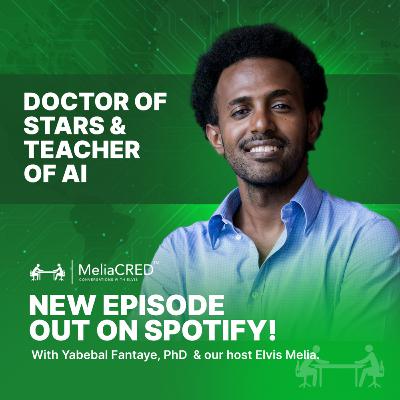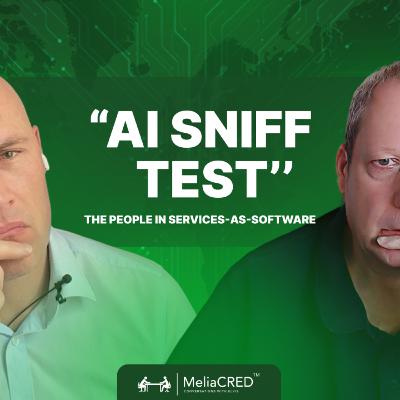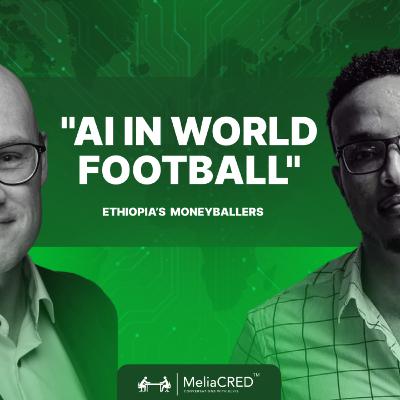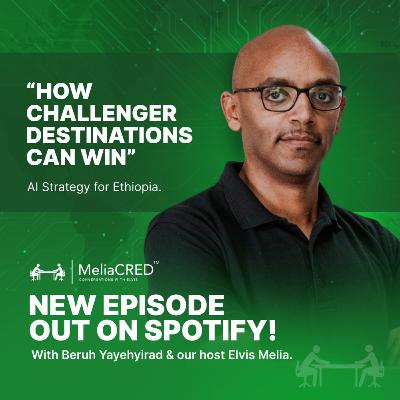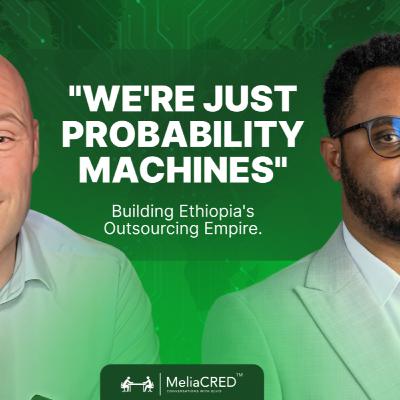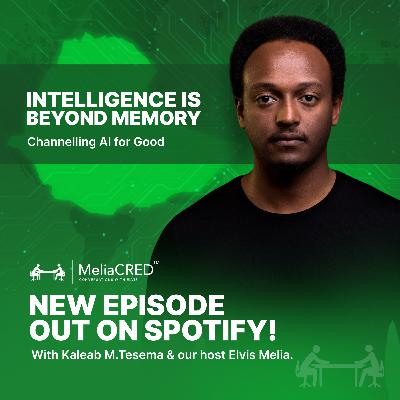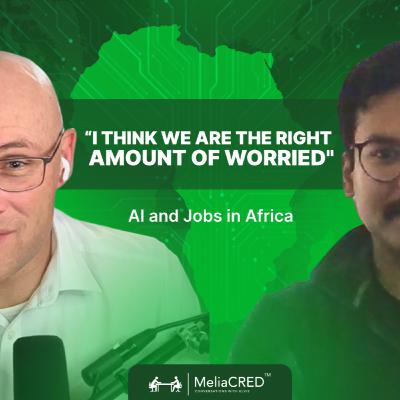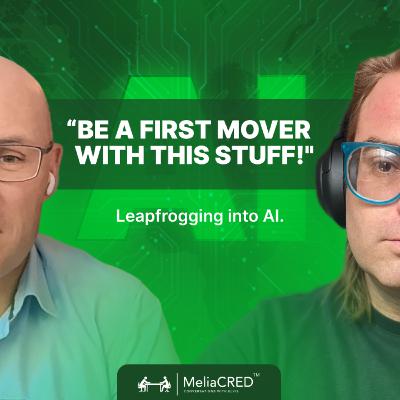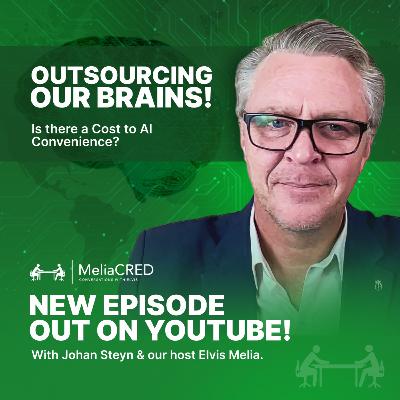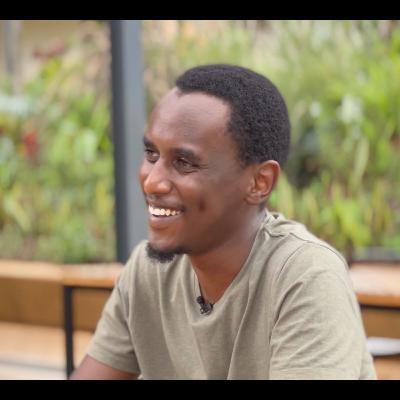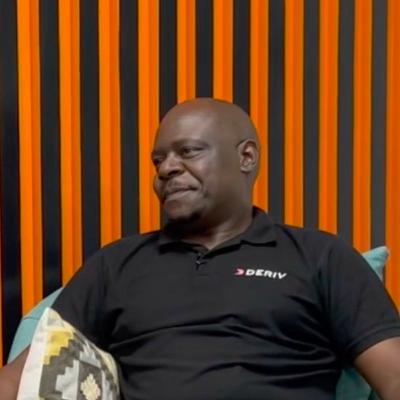Discover MeliaCRED: Conversations with Elvis
MeliaCRED: Conversations with Elvis

MeliaCRED: Conversations with Elvis
Author: Elvis Melia
Subscribed: 0Played: 0Subscribe
Share
© Elvis Melia
Description
Has the internet created a virtual labour market for new kinds of services? Does connectivity now allow job-seekers from the Global South, young people from low-income countries, to grow rich online? Did this help overcome the borders that have separated rich from poor? If not, might the Metaverse now create this new market space in the cloud? Are online labour platforms becoming immersive labour markets with equal access for all? I discuss these questions in conversations with online workers, policy makers, academics, educators, consultants, and firm executives from around the world.
22 Episodes
Reverse
Elvis speaks with Dr. Yabebal Fantaye, a cosmologist-turned-AI educator and co-founder of 10 Academy, about transforming African talent into global AI professionals through intensive boot camps. From analysing the universe with 10,000 supercomputers at Berkeley to building Ethiopia's AI workforce pipeline, Yabebal shares his remarkable journey from pursuing a Nobel Prize in physics to democratizing AI education across 21 African countries. They explore 10 Academy's intensive 3-month programs that transform beginners into job-ready AI engineers, as well as their ambitious AI4E project, targeting 1 million Africans with AI literacy. Yabebal reveals how generative AI is collapsing trust barriers for African outsourcers and why he believes Ethiopia's demographic dividend positions the country for an AI-powered economic breakthrough. About: Dr. Yabebal Fantaye is a cosmologist, data scientist, and AI educator who bridges cutting-edge research with practical education. With a PhD in Cosmology from SISSA, he worked on the Planck Consortium, analysing cosmic microwave background data alongside Nobel laureates. A World Economic Forum Young Scientist (2018) and member of the Global Future Councils, he was named among the 50 most influential Africans by Jeune Afrique Magazine. He co-founded 10 Academy in 2020 and Tenacious Intelligence Corp in 2021 and leads Astrobus Ethiopia, promoting critical thinking across the country. His work applies AI to both cosmological datasets and African development monitoring. Connect with Yabebal:– LinkedIn: https://www.linkedin.com/in/yabebal-fantaye/ – GitHub: https://github.com/yabebalFantaye – 10 Academy: https://10academy.org/ Connect with Elvis: – Website: https://meliacred.com – LinkedIn: https://www.linkedin.com/in/elvismelia/ – Substack: https://elvismeliacred.substack.com Find us on: – LinkedIn: @meliacred – Instagram: @meliacred – X/Twitter: https://x.com/ailemsivle – TikTok: @meliacred1About this Podcast: "MeliaCRED: Conversations with Elvis" explores how AI and automation reshape work, education, and economic development, particularly in Africa. This interview was conducted as part of fieldwork for research on "The Impact of Artificial Intelligence on Global Business Services in Ghana and Rwanda" (which we are currently publishing in increments on Substack) for Deutsche Gesellschaft für Internationale Zusammenarbeit (GIZ) Invest for Jobs – Special initiative "Decent Work for a Just Transition."#AI #Ethiopia #10Academy #AIEducation #AfricaTech #Cosmology #FutureOfWork #AILiteracy #Outsourcing #TechBootcamp #GlobalBusinessServices #DigitalTransformation #ArtificialIntelligence #MachineLearning #DataScience #TechEducation #AfricanTalent
Elvis speaks with David Cushman, Executive Research Leader at HFS Research, about how to separate hype from reality in agentic and generative AI and what a shift toward Services-as-Software means for people, providers, and clients. They explore where AI hits first in services, especially CX/BPO, why headcounts haven’t collapsed yet, and how value migrates toward human-AI teams and enterprise agents that actually do work.About David Cushman:David is Executive Research Leader at HFS Research, where he focuses on generative & agentic AI, automation, and the future of enterprise operations. He also serves as Editor-in-Chief of HFS’s Hot Tech program and is the author of The 10 Principles of Open Business (Palgrave Macmillan).Connect with David:LinkedIn: https://www.linkedin.com/in/davidcushmanHFS Research: https://www.hfsresearch.comConnect with Elvis:Website: https://meliacred.comLinkedIn: https://www.linkedin.com/in/elvismelia/Substack: https://elvismeliacred.substack.comFind us on:LinkedIn: @meliacredInstagram: @meliacredX/Twitter: https://x.com/ailemsivleTikTok: @meliacred1About this podcast:MeliaCRED: Conversations with Elvis explores how AI, automation, and emerging technologies are reshaping work, education, and economic development — particularly in Africa and the Global South. This interview is part of fieldwork for research on “The Impact of Artificial Intelligence on Global Business Services in Ghana and Rwanda.” Video Production: MinabTech for MeliaCRED.#AgenticAI #HumanAICollaboration #FutureOfWork #GBS #GCC #AfricaTech #MeliaCRED
Elvis speaks with Wondwesen Zewdie about what happens when data, algorithms, and national identity collide on the football pitch. They explore R&D Group’s “Moneyball” contribution to professional football analytics with artificial intelligence, and the Ethiopian outsourcing association’s (EOA’s) approach to regional and global networking in the Global Business Services sector. From data-driven solutions in one of Africa's fastest-growing economies to the geopolitical forces influencing AI's future, this conversation covers insights about innovation, strategy, and global interconnectedness.About Wondwesen Zewdie:Wondwesen Zewdie is the Managing Partner at R&D Group, a pioneering Ethiopian outsourcing and technology company known for its work in sports analytics, AI-driven data services, and talent development. With over 15 years of experience building scalable teams and platforms, Wondwesen has helped position Ethiopia as a rising hub for global business services. Beyond his leadership at R&D Group, he is also the founding president of the Ethiopian Outsourcing Association, where he advocates for the country’s growing role in the global digital economy.Connect with Wondwesen:LinkedIn: https://www.linkedin.com/in/wondwesen-zewdie-46896461/Website: http://www.randdethiopia.comConnect with Elvis:Website: https://meliacred.comLinkedIn: https://www.linkedin.com/in/elvismelia/Substack: https://elvismeliacred.substack.comFind us on:LinkedIn: @meliacredInstagram: @meliacredX/Twitter: https://x.com/ailemsivleTikTok: @meliacred1 About this podcast:MeliaCRED: Conversations with Elvis explores how AI, automation, and emerging technologies are reshaping work, education, and economic development particularly in Africa and the Global South. Video Production: MinabTech for MeliaCRED.This episode is part of fieldwork for research on “The Impact of Artificial Intelligence on Global Business Services in Ghana and Rwanda” which you can find on Substack at https://elvismeliacred.substack.com/p/the-impact-of-artificial-intelligence#AIandFootball #MoneyballAfrica #AIForDevelopment #FutureOfWork #AfricaTech #GlobalSouth
Elvis speaks with Georgina Hutchinson, Associate Partner at Dalberg Data Insights and former Senior Advisor at the Tony Blair Institute for Global Change. Georgina has spent years at the intersection of technology, policy, and governance, working to democratize AI for the public good.In this episode, they explore what life could look like in the company of artificial general intelligence (AGI). From AI consciousness to job creation in the Global South, from digital public infrastructure to the ethics of AI-enabled decision-making. This conversation digs into the messy, exhilarating, and uncertain terrain of the post-AGI era. Topics Covered:– What happens after AGI?– Could Africa thrive in an AI-powered gig economy?– Universal Basic Income in the Global South: pipe dream orsmart policy?– Does critical thinking still matter in an AI-dominated world?– The risks of lifeless AI systems convincing us that they areconscious– What AI safety looks like in an unregulated arms race– How art and the human experience may become more important About Georgina Hutchinson:Georgina is an Associate Partner at Dalberg Data Insights, where she works to make AI accessible and impactful for public sector and development-focused institutions. Previously, she was a Senior Policy Advisor at the Tony Blair Institute for Global Change, where she supported governments across Africa ondigital transformation and AI readiness. She holds degrees from SOAS University of London and the University of Cambridge. Connect with Georgina:LinkedIn: https://www.linkedin.com/in/georgina-hutchinson-95505218/ Connect with Elvis:🌍Website: MeliaCRED🔗LinkedIn: @elvismelia✏️ Substack: elvismeliacred Find us on:📍LinkedIn: @meliacred📷Instagram: @meliacred🕊X/Twitter: https://x.com/ailemsivle🎵TikTok: @meliacred1 About this podcast:MeliaCRED: Conversations with Elvis explores how AI, automation, and emerging technologies are reshaping work, education, and economic development—particularly in Africa and the Global South. Video Production: MinabTech for MeliaCRED. This episode is part of fieldwork for research on “The Impact of Artificial Intelligence on Global Business Services in Ghana and Rwanda” which you can find on Substack at https://elvismeliacred.substack.com/p/the-impact-of-artificial-intelligence#AGI #FutureOfWork#AIForDevelopment #AIConsciousness #AfricaTech #DigitalGovernance #UBI#CriticalThinking #GigEconomy #Dalberg #AIandEthics #AIandPolicy #AI4Gov#AI4Good #ElvisMelia #MeliaCRED
Elvis speaks with Jente Rosseel, founder and CEO of Elewa, a Nairobi-based technology and education company working primarily with startups and SMEs across Europe, the UK, and South Africa. Jente shares his journey from Belgium to Kenya, detailing how Elewa bridges the gap between ambitious startups and cutting-edge technological solutions through innovative apprenticeship programs, managed talent accelerators, and professional development.They explore how Elewa evolved from an EdTech startup into a dynamic group that provides comprehensive technology services, including product design, software development, and ERP systems integration. About Jente Rosseel:Jente Rosseel is the founder and CEO of Elewa, a versatile engineer by trade and an educator at heart. With a Master’s degree in Computer Science from Vrije Universiteit Brussel, Jente is passionate about leveraging technology and innovative educational models to unlock human potential. Elewa provides robust technological solutions for startups and SMEs while creating meaningful job opportunities through apprenticeship programs and senior talent accelerators. Under his leadership, Elewa has earned recognition including the UNESCO ICT in Education Prize and selection for Google’s Launchpad Africa Accelerator.Connect with Jente:LinkedIn: / jrosseel Elewa: elewa.co.keConnect with Elvis: Website: https://meliacred.com LinkedIn: / elvismelia Find us on:LinkedIn: / meliacred Instagram: / meliacred X/Twitter: https://x.com/ailemsivle TikTok: / meliacred1About this Podcast:MeliaCRED: Conversations with Elvis explores how AI, automation, and innovative technology are reshaping work, education, and economic development, particularly in Africa. This interview is part of fieldwork for research on "The Impact of Artificial Intelligence on Global Business Services in Ghana and Rwanda" for Deutsche Gesellschaft für Internationale Zusammenarbeit (GIZ) Invest for Jobs Special initiative "Decent Work for a Just Transition."Video Production: MinabTech for MeliaCRED.#KenyaTech #AI #Innovation #Elewa #Startups #SME #Technology #FutureOfWork #TalentDevelopment #EdTech #GBS #Automation #DigitalTransformation #AfricaTech
Elvis speaks with Beruh Yayehyirad Kitaw, Director of Technology at MMCY, a global talent company based in Addis Ababa. MMCY operates at the intersection of technology outsourcing and business process outsourcing, providing talent across tech and customer support. Beruh describes MMCY's journey from a purely tech-focused firm to a hybrid organisation, their use of AI agents in recruitment and talent management, and Ethiopia’s potential as a challenger among outsourcing destinations. He explores practical lessons learned from implementing AI, ethical considerations, and the changing landscape of software development careers.Topics covered:MMCY's hybrid approach: tech and BPOUsing AI agents in recruitment and talent managementChallenges and strategies for scaling outsourcing servicesEthical considerations in AI-driven recruitmentEthiopia’s competitive advantages in outsourcingThe evolving role of software developersHow young Ethiopians can prepare for an AI-driven job marketAbout Beruh Yayehyirad Kitaw:Beruh leads the technology division at MMCY in Ethiopia, overseeing around 200 tech specialists, including software engineers, developers, and AI engineers. With expertise in tech solutions, AI implementation, and talent management, Beruh and his team drive MMCY’s growth and innovation.Connect with Beruh:Website: https://mmcy.techLinkedIn: https://www.linkedin.com/in/beruh-yayehyirad-kitaw-71b6314/Connect with Elvis: Website: https://meliacred.com LinkedIn: https://www.linkedin.com/in/elvismelia/Find us on:LinkedIn: https://www.linkedin.com/company/meliacred/Instagram: https://www.instagram.com/meliacred/X/Twitter: https://x.com/ailemsivle TikTok: https://www.tiktok.com/@meliacred1About this podcast:MeliaCRED: Conversations with Elvis explores how AI and automation are reshaping work, education, and economic development, particularly in Africa. Conducted as part of Elvis's research for "The Impact of Artificial Intelligence on Global Business Services in Ghana and Rwanda" for Deutsche Gesellschaft für Internationale Zusammenarbeit (GIZ) Invest for Jobs – Special initiative "Decent Work for a Just Transition."Video Production: MinabTech for MeliaCRED.#aiinethiopia #EthiopiaTech #outsourcing #airecruitment #talentmanagement #artificialintelligence #futureofwork #digitaltransformation #techforgood #innovation #softwaredevelopmentengineer #africarising #GlobalBusinessServices #MeliaCRED
Elvis speaks with Samuel Mussie, Chief Technology Officer and co-founder of Mereb Technologies, about Ethiopia's rapid transformation into a software outsourcing destination and the double-edged impact of AI on junior developers. As the CTO at Mereb Technologies, Samuel is passionate about turning complex tech challenges into seamless, user-friendly solutions for global partners, leading a talented team that has grown from startup to a company with 40 employees, expanding rapidly to 60 people.Topics covered:Ethiopia's software boom: from zero to outsourcing hub in 5 yearsThe "surfboard vs swimming" dilemma: AI tools vs foundational coding skillsWhy junior developers are losing jobs while the sector growsReal-money gaming platforms and complex financial backendsBuilding Ethiopia's tech ecosystem through collaboration, not competitionThe demographic advantage: average age of 18 in a digitising economyFrom pen-and-paper businesses to super apps: Ethiopia's digitisation gapWindsurf, Cursor, and the future of English as a programming languageWhy "idea people" are winning in the AI eraKey insight: "These generative AI tools are causing a knowledge gap because junior developers are using them as their backbone, not as tools. If you can't explain how the thing you wrote works, it's going to be a problem when it's pushed to production."About: Mereb Technologies is an IT outsourcing company based in Ethiopia dedicated to providing developer outsourcing services globally. The name "Mereb" is derived from the Amharic term for "web," symbolizing their commitment to utilizing local expertise to serve the global market Mereb Technologies provides comprehensive solutions in software outsourcing: from support in product development to general digital transformation, testing, and maintenance, while also hosting the popular "Mereb Podcast" in Amharic to network Ethiopia's emerging tech ecosystem.Connect with Samuel:LinkedIn: https://www.linkedin.com/in/samu-el/Mereb Technologies: https://mereb.tech/Company LinkedIn: https://et.linkedin.com/company/mereb-technologiesAbout this podcast: MeliaCRED: Conversations with Elvis explores how AI and automation reshape work, education, and economic development, particularly in Africa. Conducted as part of research for "The Impact of Artificial Intelligence on Global Business Services in Ghana and Rwanda" for Deutsche Gesellschaft für Internationale Zusammenarbeit (GIZ) Invest for Jobs.Video Production: MinabTech for MeliaCRED.#AIInEthiopia #SoftwareOutsourcing #EthiopiaTech #AIAndJobs #CodingSkills #JuniorDevelopers #TechEcosystem #AddisAbaba #AITools #Programming
Elvis speaks with Kaleab Mezgebu, co-founder and CEO of MinabTech in Addis Ababa, about practical applications of AI in Ethiopia. Kaleab shares how MinabTech developed HaHuJobs, an AI-driven employment platform, and discusses the role of AI in addressing employment, data classification, and efficiency. They explore Ethiopia's economic development, sociopolitical challenges, and the realistic limitations of AI in driving meaningful change.Topics covered:Practical AI implementation at MinabTechEmployment in Ethiopia (HaHuJobs)Data aggregation and classificationTechnological growth vs. human developmentScepticism of AI replacing human intelligenceEconomic and sociopolitical context in EthiopiaTechnology’s role in poverty reductionAbout: Kaleab Mezgebu is Co-Founder and CEO of MinabTech, a software development firm in Ethiopia. He specialises in cloud solutions, software integration, and has built a youth employment platform.Connect with Kaleab: MinabTech: https://www.minabtech.com HaHuJobs: https://www.hahu.jobsLinkedIn: https://www.linkedin.com/in/kaleab-m-tesema/About this podcast: MeliaCRED: Conversations with Elvis explores how AI and automation reshape work, education, and economic development, particularly in Africa. Conducted as part of research for "The Impact of Artificial Intelligence on Global Business Services in Ghana and Rwanda" for Deutsche Gesellschaft für Internationale Zusammenarbeit (GIZ) Invest for Jobs – Special initiative "Decent Work for a Just Transition."Video Production: MinabTech for MeliaCRED. #AIInEthiopia #EthiopiaTech #ArtificialIntelligence #AIinAfrica #Ethiopia #Innovation #FutureOfWork #DigitalTransformation #TechForGood #Productivity #JobCreation #Development #GBS (Global Business Services) #podcast #Leadership #AfricanTech #Impact
Rahul Srivatsa is the Managing Director of Techno Brain GBS. We spoke about the transformation of business process outsourcing (BPO), the automation threat to contact centres, and what workforce planning could look like across Africa in the ear of artificial intelligence (AI). Topics covered: How BPO operations may change with AI; the geographic diversification of global business services post-COVID; the different levels of customer support roles that may survive the AI transition; real-time accent neutralization and language translation breakthroughs; from individual BPO to AI agent management - the future workforce model; enterprise AI adoption challenges vs consumer-level capabilities; strategic upskilling - teaching AI collaboration over traditional coding; Africa's demographic dividend: opportunity or automation casualty? The difference between AI assistance and AI replacement. Techno Brain GBS is an IT outsourcing and consulting company with operations in Africa and the USA. They specialise in software development, quality assurance, and contact centre operations. Rahul has deep expertise in both the technical and business sides of global service delivery, and offers insight into how AI is reshaping the outsourcing landscape. He holds a Master's in Economics from Boston University. Connect with Rahul: LinkedIn: https://www.linkedin.com/in/rahulsrivatsa/Techno Brain GBS: https://technobraingroup.com About this podcast: MeliaCRED: Conversations with Elvis explores how artificial intelligence and automation are reshaping work, education, and economic development - particularly in Africa. This interview was conducted as part of the fieldwork for research on "The Impact of Artificial Intelligence on Global Business Services in Ghana and Rwanda" for Deutsche Gesellschaft für Internationale Zusammenarbeit (GIZ) Invest for Jobs – Special initiative "Decent Work for a Just Transition." Video Production: MinabTech for MeliaCRED.
A discussion with Barrett Nash, founder of InfiniteUp, about building AI-powered business tools, the democratization of artificial intelligence, and strategic career planning for the AI era.Topics covered:– Building "thick wrappers" vs simple AI integrations– The symbiotic relationship between humans and AI– GPT-4.5's breakthrough in multilingual capabilities– Why coding as a career path may become obsolete soon– Call center transformation through real-time language translation– Five-year career plans for different age groups– Consciousness – emerging awareness or sophisticated mimicry?– Natural language as the new programming interfaceAbout:Barrett Nash is a serial entrepreneur who is building an AI-powered business management platform focused on small businesses. He previously founded and led SafeMotos (later CanGo), which became the largest motorcycle taxi platforms in Rwanda and Congo, facilitating thousands of daily trips across both markets. Now based in Tbilisi, Georgia, Barrett builds tools that democratize access to AI capabilities for entrepreneurs and small businesses. Connect: X: https://x.com/barrett_nashLinkedIn: https://www.linkedin.com/in/barrettnash/ InfiniteUp: https://infiniteup.dev/About this podcast: Conversations with Elvis explores how artificial intelligence and automation are reshaping work, education, and economic development - particularly in Africa. This interview was conducted as part of the fieldwork for research on "The Impact of Artificial Intelligence on Global Business Services in Ghana and Rwanda" for Deutsche Gesellschaft für Internationale Zusammenarbeit (GIZ) Invest for Jobs – Special initiative "Decent Work for a Just Transition" Video Production: Minab Technologies for MeliaCRED
Johan Steyn is often referred to as Africa's leading AI commentator. In 2019, Wealth & Finance magazine (UK) crowned him the "Best AI & Robotics Management Consultant." He regularly contributes thought-leadership articles to major publications, including Reuters, Business Day, The Sunday Times, Finweek, News24, ITWeb, and Brainstorm Magazine. He is also a regular expert guest on television and radio shows, such as BusinessDay TV, DSTV, Cape Talk, PowerFM, and RSG. We discuss – Why traditional universities may become irrelevant within a decade– The transition from coding skills to AI collaboration capabilities– Africa's demographic dividend and the Business Process Outsourcing industry transformation– Critical thinking in an age of AI-generated content– The coordination challenges in AI safety and developmentConnect with Johan:LinkedIn: https://www.linkedin.com/in/johanosteyn/ AI for Business: https://www.aiforbusiness.net/ About this podcast:In Conversations with Elvis, we explore how artificial intelligence and automation are reshaping work, education, and economic development - particularly in Africa. This interview was conducted as part of the fieldwork for research on "The Impact of Artificial Intelligence on Global Business Services in Ghana and Rwanda" for Deutsche Gesellschaft für Internationale Zusammenarbeit (GIZ) Invest for Jobs – Special initiative "Decent Work for a Just Transition"Video Production: Minab Technologies for MeliaCRED.
After a long career at the Boston Consulting Group, Martin Hecker created AmaliTech, a social business that specializes in exporting digital services from Africa to the world. Martin also created the DSAA, a club that funnels German development aid funding to global business services firms that set up offices in Africa.
Software development is one of the most complex and best-paying jobs that can be offshored. This is what put the Indian IT-enabled Services sector on the global map. Yet a global talent shortage still exists. As ever more young Africans now enter digtal labour markets, ever more young software developers become available to the world. In this conversation, I speak with Objectivity's Jacques Nyilinkindi about the changes and opportunities in Kigali's technology ecosystem.
Global Business Services (GBS) companies come in many shapes. Deriv is an online brokerage firm that turned Kigali, Rwanda, into one of its global delivery locations. I spoke with Godfrey Zveynika, the Country Manager, about Kigali as Deriv's decision for its Africa office, about Rwanda as a possible destination for other GBS firms, about Kigali's eco-system of digital services exporters, and about the pros and cons of different African countries for building service export clusters in the coming years.
Show less
Are you a Rwandan graduate, looking to start your career in IT services? Are you a Global Business Services firm, looking for a new delivery location in Africa? Are you a government official, seeking to facilitate a digital services export cluster in your country? Are you an international development partner, hoping to support future-oriented job creation in an African metropolis? If you ticked yes on any of the above, please take a few minutes to listen to Gary Bennett speak about Kigali's emerging hub of services exports.
Kigali is home to a tight-knit ecosystem of up-skilling and work-readiness programs, tailored to the Global Business Services (GBS) sector. Firms interested in coming to Rwanda to export IT-enabled services, or firms interested in importing digital services through the internet from Rwanda might find this conversation interesting. In it, I speak with Vivens Uwizeyimana, founder and CEO of Umurava, a talent marketplace and workforce outsourcing platform. This is the last of our "ecosystem conversations," before we hear from the global companies who recently set up their offices in Kigali.
Across the world, many people's dream job is located somewhere in the creative economy. Making films and creating video content has become much more accessible over the past few years, and as the digital realm brings the world closer together, collaborations across borders can emerge in creative fields that were hitherto limited by geography. In our conversation, Hassan Tha Kreator tells me about his journey as a young filmmaker from Nigeria to Rwanda. We speak about the vast differences between these two countries, the future of African filmmaking, and how the strengths of different countries can complement each other as Africa's creative economy expands.
Imagine you're a global business services firm, thinking of setting up a new delivery center in an African country. Your first problem will be to decide on the right country. The next problem will be to figure out how to manage the local workforce. What are the labor laws, customs, and skill levels in that country? PesaChoice is a human resources management platform that seeks to help incoming companies with this second challenge. As PesaChoice expands across the continent (currently in Cote d'Ivoire, Kenya, Rwanda, and Uganda), part of its service becomes helping incoming firms solve their first challenge of comparing the pros and cons of different African locations.
Pépita and I have a broad conversation about the opportunities for Rwanda's young population, about the differences in customs and culture between different countries, and about her own life as a parallel to Rwanda's development.
When Global Business Services (GBS) firms choose new delivery locations, they look for stable governance, conducive regulations, reliable infrastructure, and workers with the right skills. Rwanda already tops Africa’s charts on governance, regulations, and infrastructure. And the Government has now begun an initiative with international development partners to train a large pool of GBS workers. Oriane and I discuss Kigali’s GBS ecosystem, and she introduces EF’s English language training pilot, which is tailored to GBS agents and free of charge for any GBS firms.
Rwanda's progress over the past three decades has turned this small country into one of Africa's emerging technology hubs. Global Business Services (GBS) companies have recently set up delivery locations in Rwanda’s capital, Kigali, and Joseph Semafara is a leading figure in providing these investors with a "soft landing." His company, SOLVEIT AFRICA, trains young graduates to become GBS agents. Together with other training providers in the Kigali ecosystem, Joseph works closely with the firms that are already in Rwanda, and with firms that are currently on the cusp of making Kigali their next delivery location.
In our conversation, Joseph and I discuss how Kigali‘s ecosystem of digital services exports has changed over the past 2-3 years, and what this seems to have unleashed for Rwanda.


